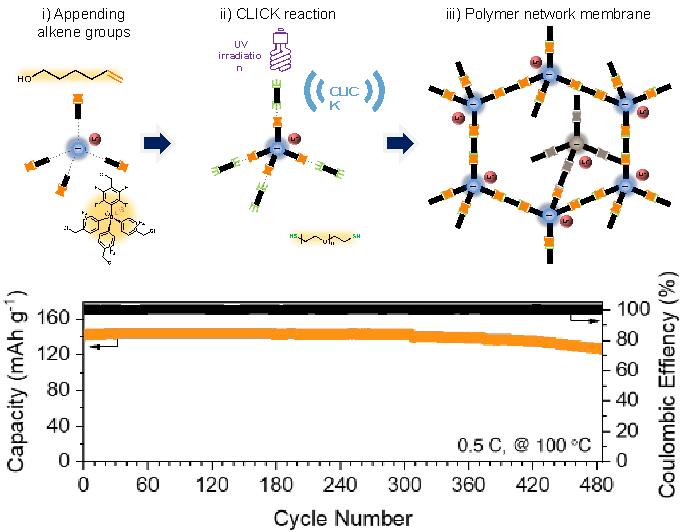Accelerated Selective Li+ Transports Assisted by Microcrack-Free Anionic Network Polymer Membranes for Long Cyclable Lithium Metal Batteries
- failyf22
- May 10, 2024
- 1 min read
Prof. Shin Dong-Myeong and his team work on research for development of new anionic network polymer electrolytes for long cyclable lithium metal batteries under high temperature. This work entitled “Accelerated Selective Li+ Transports Assisted by Microcrack-Free Anionic Network Polymer Membranes for Long Cyclable Lithium Metal Batteries” has been published in Advanced Science.
Details of the publication:
Accelerated Selective Li+ Transports Assisted by Microcrack-Free Anionic Network Polymer Membranes for Long Cyclable Lithium Metal Batteries, Advanced Science, (2024) 11, 2308530
Jingyi Gao, Jiaming Zhou, X. Chen, R. Tao, Y. Li, Y. Ru, C. Li, Eunjong Kim, Xiaoting Ma, M. Wang, Y. Kim, S. Lee, Dong-Myeong Shin*
Abstract:
Rechargeable Li metal batteries have the potential to meet the demands of high-energy density batteries for electric vehicles and grid-energy storage system applications. Achieving this goal, however, requires resolving not only safety concerns and a shortened battery cycle life arising from a combination of undesirable lithium dendrite and solid-electrolyte interphase formations. Here, a series of microcrack-free anionic network polymer membranes formed by a facile one-step click reaction are reported, displaying a high cation conductivity of 3.1 × 10−5 S cm−1 at high temperature, a wide electrochemical stability window up to 5 V, a remarkable resistance to dendrite growth, and outstanding non-flammability. These enhanced properties are attributed to the presence of tethered borate anions in microcrack-free membranes, which benefits the acceleration of selective Li+ cations transport as well as suppression of dendrite growth. Ultimately, the microcrack-free anionic network polymer membranes render Li metal batteries a safe and long-cyclable energy storage device at high temperatures with a capacity retention of 92.7% and an average coulombic efficiency of 99.867% at 450 cycles.






Comments